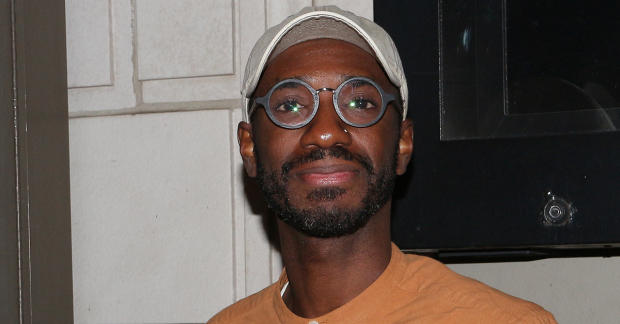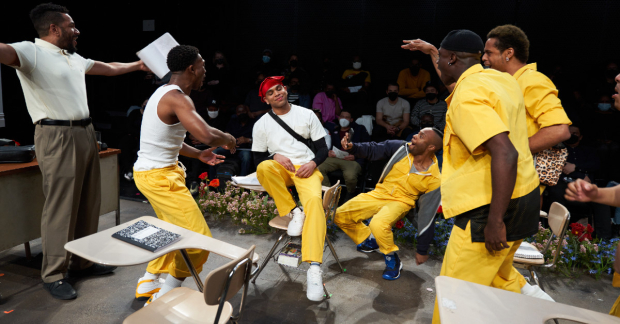Interview: Playwright Donja R. Love on Building the World of MCC Theater's Soft
The essence of the new play from Donja R. Love delivers on its title. Soft, now having its New York premiere at the Robert W. Wilson MCC Theater Space through July 17, is a work about a side of Black masculinity that's rarely seen on stage, and tells the story of a teacher at a juvenile boarding school whose life is rocked when one of his students commits suicide.
This aptly named work is about finding the softness within yourself, and being able to use it to navigate the world. Our critic specifically called it "as emotionally engaging as anything I've seen in months." Here, love tells us about what led him to write the play, and about sharing this perspective.

(© David Gordon)
This conversation has been condensed and edited for clarity.
Tell me about soft.
Essentially, it's about a teacher at a juvenile boarding school, and one of the students dies by suicide. The teacher becomes obsessed with what he could have done to prevent it, and also making sure that none of his other students die by suicide. It's also about two brothers reconnecting. We see all of these things play out. This play is over 13 years in the making, so I am super happy that people are getting to experience this softness that I've been cultivating.
What made you want to tell this story?
I was going through an incredibly dark moment in my life after getting some life-changing news, and the best thing for me was writing. At the time, I was doing assistant teaching and going into after school programs, working with students who weren't that far removed from the students in the play. It was sad, and an interesting space to be in, because I was going though something that was so arduous, and I had students dealing with the same circumstances. It was such a dark space for me to be in at the time, but I also had students who needed me. So I had to find a way of navigating when to hold space for myself, and when to hold space for my students. How can I be there for both of us? And when do I need to say that I need to hold more space for myself, or that I need to hold more space for my students? It was a true act and exercise of softness. Writing soft actually helped me become softer during that time.

(© Daniel J. Vasquez)
I can't think of many plays like this, about teachers and students, so I appreciate your putting this on stage from that perspective.
And also being able to see a group of people who we seldom get to see reflected on stage. This is a teacher who's working in juvie. This is a teacher who's working with students who have committed crimes or who were believed to have committed crimes. And the crime very much could just be the color of their skin. So this is why you're now in this hardened space. But even in this space that is so hard, even in a world that is so hard, you can find softness, and how beautiful it is that we see that through this teacher and his students. These individuals, against all odds, are finding and cultivating softness so they can survive.
Why was it important for you to have a female-identifying director in the room to stage this play?
This play is largely dominated by male-identifying characters, so it was very intentional and necessary to have a woman in the house, specifically a Black woman and specifically Whitney. Whitney is so imaginative, and is so experimental, and is very loving and soft in her own right.
What does her presence bring to this production?
What she brings is the reminder that all of these characters have femininity in their lives. We all have mothers – whether the relationships are beautiful or whether they aren't – we all have these maternal figures, and having a Black woman in the house reminds us that we area all rooted in femininity. Yes, the play is exploring masculinity and how toxic it can be, but it also has space for femininity and how it flows through us, even the most masculine of individuals.











